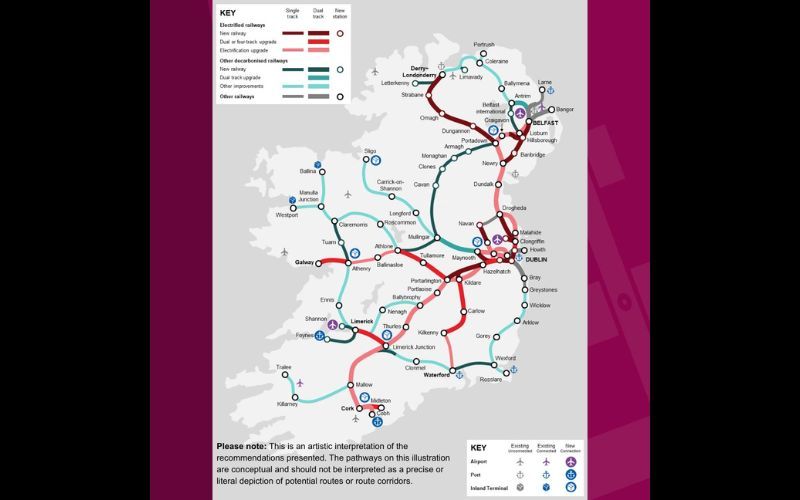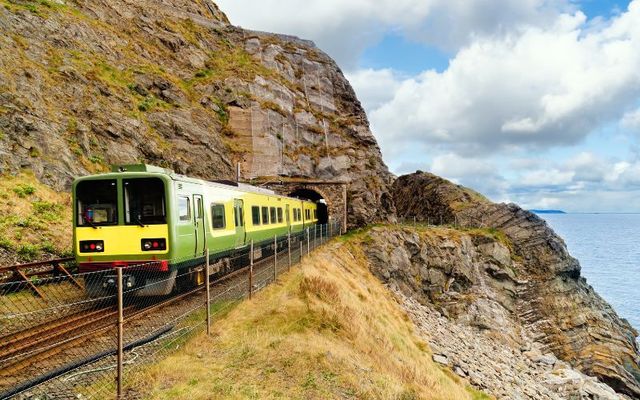The Department of Transport in Ireland and the Department for Infrastructure (DfI) in Northern Ireland published the Final Report of the All-Island Strategic Rail Review, developed in the context of the “New Decade, New Approach” agreement, on Wednesday, July 31.
Ireland's Department of Transport notes that the Report sets out 32 strategic recommendations to enhance and expand the rail system in Ireland and Northern Ireland up to 2050, aligning with net carbon zero commitments in both jurisdictions.
The recommendations seek to transform the quality of the rail system to the benefit of passengers and wider society on the island, through additional track capacity, electrification, increased speeds, and higher service frequencies.
Furthermore, the vision involves the construction of new rail lines, particularly in the North Midlands and North West, widening accessibility and connectivity.
The All-Island Strategic Rail Review was first announced in 2021.
? The Final Report of the All-Island Strategic Rail Review has been published
? The Report sets out 32 recommendations to enhance and expand the rail system in Ireland and Northern Ireland up to 2050, with net carbon zero commitments
?? https://t.co/L1iGzPc0bN pic.twitter.com/pG0vmX96uf
— An Roinn Iompair - Department of Transport (@Dept_Transport) July 31, 2024
Related to the goals of the Review, the recommendations in the Report by theme include the following:
Decarbonisation
- Decarbonise the rail network, mainly through the overhead electrification of the intercity network, while rural and regional lines could be powered by battery-electric or hydrogen trains.
- Procure new hybrid and electric train rolling stock.
Intercity
- Increase top speeds to 200km/h (125mph) on the core intercity railway network (Dublin, Belfast, Cork, Limerick, Galway, Waterford, Derry~Londonderry) which, along with an upgrade to track capacity as outlined next, provides for train journeys that are typically faster than the car.
- Upgrade much of the single-track cross-country rail network to a double-track railway (and four-track in places), for example between Portarlington and Athlone on the Galway line.
- Increase intercity service frequencies to at least hourly.
Regional and Rural
- Provide more direct services between Ireland’s West and South Coasts, for example between Galway, Limerick, and Cork.
- Increase service frequency to at least one train every two hours.
- Increase regional and rural line speeds to at least 120km/h (75mph).
- Reinstate the Western Rail Corridor between Claremorris and Athenry.
- Extend the railway into Co Tyrone (from Portadown to Dungannon, Omagh, Strabane), Derry-Londonderry, and to Letterkenny in Co Donegal.
- Reinstate the South Wexford Railway, connecting to Wexford to Waterford.
Develop the railway to boost connectivity in the North Midlands, from Mullingar to Cavan, Monaghan, Armagh, and Portadown.
Sustainable Cities
- Interventions that can support plans for commuter, inter-urban rail and international connectivity through the cities, noting that many of these interventions fall outside of the scope of the Review and will be advanced by metropolitan area transport plans.
- Segregate long-distance and fast services from commuter services through additional track capacity, reducing journey times to/from cities.
Freight
- Strengthen rail connectivity to the island’s busiest ports and reduce Track Access Charges for freight.
- Develop first-mile-last-mile rail access for Dublin Port.
Customer Experience
- Improve service quality, with better provision of customer information and catering, “clock-face” timetabling, and better integration with other transport options.
- Invest in a rolling programme of accessibility improvements, including step-free access.

Artistic interpretation of the recommendations in the Report published on July 31. (Ireland's Department of Transport)
The final Report published on Wednesday has taken account of responses received to a draft Report and Strategic Environmental Assessment (SEA) published for public consultation last year. The recommendations for rail in the Report have been developed through an evidenced-based review taking into account goals such as connectivity, sustainability, and economic feasibility.
As part of an evidence-based approach, a high-level economic appraisal was carried out to help ensure that the Review’s recommendations represent value-for-money. The Report estimates that the capital cost of implementing all of the recommendations by 2050 is in the order of €35bn-€37 billion/£29-£31 billion in 2023 prices, and that the monetised benefits to society from such investment would cover the costs, meeting the goal of economic feasibility. A more detailed evaluation would be conducted on individual projects brought forward for consideration.
Ireland's Minister for Transport, Ireland, Eamon Ryan, said on Wednesday that the Report offers "the most ambitious vision for rail in a century, bringing us forward to a new age of rail."
Northern Ireland's DfI Minister, John O’Dowd, stated: “This publication brings us to a new chapter where we can shape a better future for everyone by decarbonising key services and investing in climate adaptation measures, while at the same time supporting economic productivity through projects, policy and legislation.
"Getting infrastructure right, and investing in it accordingly, can create the foundations for better rural and urban communities.”
O'Dowd noted that the Report has been "an excellent example of joint collaboration on cross-border priorities, and this continued partnership will be key to realising its ambitions."
Ireland's Department of Transport added that in the coming months, rail services on the island are to be developed towards the Report’s vision. This includes an increase to an hourly train service between Dublin and Belfast, and additional services between Dublin and Galway, while procurement has also started on a new, faster, more sustainable “Enterprise” train fleet for the Dublin-Belfast route.
Moreover, assisted by the European Investment Bank (EIB) Advisory Services, the Department of Transport and DfI, and agencies north and south, are working to progress the Report’s recommendations in the years ahead, maintaining momentum. This includes a more detailed identification of rail priorities to pursue over the next decade. Progress in following up on the Rail Review will be reported on as appropriate through the North South Ministerial Council.




Comments